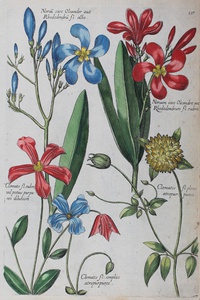| Method | Copper engraving with hand colouring |
| Artist | Matthäus Merian |
| Published | Frankfurt, 1641 |
| Dimensions | Plate 270 x 180 mm, Sheet 342 x 210 mm. |
| Notes |
Text in plate reads: Neriu sive Oleanbder aut Rhododendru fl. albo. Nerium sive Oleander aut Rhododendrum fl. rubro. Clematis fl rubo vel potius purpurea dilutiori. Clematis fl. simplici atropurpureo. Clematis fl. pleno atropurpureo. A depiction of oleander and clematis from Matthäus Merian's Florilegium renovatum et auctum: variorum maximeque rariorum germinum, forum ac plantarum. Merian's Florilegium renovatum et auctum, first published in 1641, was an enlarged version of Johann Theodor de Bry's (1561 - 1623) Florilegium novum, hoc est: variorum maximeque rariorum florum ac plantarum singularium un cum suis radicibus & cepis. First published in 1611, with several issues being published over the following few years, de Bry's version drew upon a variety of sources for the illustrations, including Pierre Vallet's Le Jardin du Roy (Paris, 1608), Basilius Besler's Hortus Eystettensis (Eichstatt and Nuremberg, 1613) and Crispian van de Pass's Hortus floridus (Utrecht and Arnheim, 1614-1616). De Bry's plates, however, were much more than simply copies. Careful composition, confident lines and fine shading are vividly apparent in de Bry's illustrations. 18 years after de Bry's death, Merian produced Florilegium renovatum et auctum. Merian's version contained nearly double the amount of plates as de Bry's, and depicted the exotic flowers and plants growing in the gardens in and around Frankfurt. A later edition of Florilegium renovatum et auctum was published in 1644. Matthäus Merian the Elder (22 September 1593 - 19 June 1650) was a Swiss engraver born in Basel. Beginning his career in Zürich where he learned the art of copperplate engraving, Merian went on to study and work in various cities throughout France. In 1615, Merian returned to Basel. His return to Basel, however, was short lived, moving to Frankfurt the following year to work for the publisher Johann Theodor de Bry. Merian later married de Bry's daughter. He was also the father of Maria Sibylla Merian, one of the greatest natural history artists of the late 17th and early 18th centuries. Following de Bry's death in 1623, Merian took over his father-in-law's publishing house. Gaining his citizenship in Frankfurt in 1626, Merian was able to work as an independent publisher, where he spent the majority of his career. Conditon: Trimmed tight on the right and margin added. |
| Framing | mounted |
| Price | £380.00 |
| Stock ID | 51286 |

